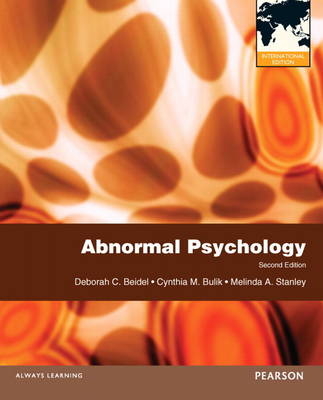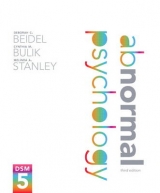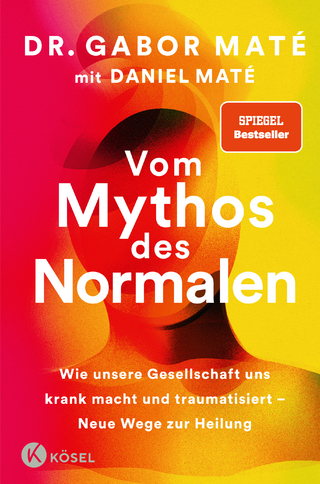
Abnormal Psychology
Pearson (Verlag)
978-0-205-19773-6 (ISBN)
- Titel erscheint in neuer Auflage
- Artikel merken
Deborah Beidel, Cynthia Bulik, and Melinda Stanley take a scientist-practitioner-educator approach and help students see and understand the connection between the science and practice of abnormal psychology.
This leading-edge author team, consisting of three active researchers, clinicians, and educators, take a scientist-practitioner approach emphasizing the rich blend of both the science and practice of abnormal psychology throughout the text. The developmental trajectory of each condition is discussed where appropriate and scientific findings with respect to race and gender are incorporated into discussions about each condition. Biological findings are integrated with findings from social and behavioral sciences, highlighting the complexity of abnormal behavior and how it is often influenced by a wide range of variables. The authors encourage students to look at psychological disorders along a continuum and analyze disorders in terms of whether the individual’s behavior creates distress or impairs daily functioning. Importantly, an effort is made to “bring to life” the nature of these conditions by providing vivid clinical descriptions. In addition to short descriptions used liberally throughout each chapter, a fully integrated case study is presented at the end of each chapter, again illustrating the interplay of biological, psychosocial and emotional factors.
Teaching & Learning Experience
Personalize Learning — The new MyPsychLab delivers proven results in helping students succeed, provides engaging experiences that personalize learning, and comes from a trusted partner with educational expertise and a deep commitment to helping students and instructors achieve their goals.
Improve Critical Thinking — Students are encouraged to think critically about current controversial issues in the field and to consider the fine line between “normal” and “abnormal” behavior.
Engage Students — Real cases in the text based on the authors’ own clinical files along with videos of real people with psychological disorders on MyPsychLab engage students in the material and help to destigmatize disorders.
Explore Research — Icons highlight what is know about the developmental trajectory of each condition. Virtual Reality therapy and other topics engage students in current research and help them see the relationship between science and clinical practice.
Support Instructors — Speaking Out video interviews featuring real people with psychological disorders, along with their family and friends, help instructors engage students both in and out of the classroom. Included on DVD, on MyPsychLab, and embedded in the PowerPoint slides, these and other resources provide extensive support for instructors.
Note: MyPsychLab does not come automatically packaged with this text. To purchase MyPsychLab, please visit: www.mypsychlab.com or you can purchase a valuepack of the text + MyPsychLab (at no additional cost). VP: 9780205248421
Sample chapter and more available on our preview site! www.pearsonhighered.com/fall2011preview/#Psych
Students and Instructors, find us on Facebook! Login and search for: Beidel/Bulik/Stanley, Abnormal Psychology
Deborah C. Beidel, Ph.D., ABPP Dr. Beidel received her Ph.D. from the University of Pittsburgh and completed her internship and post-doctoral fellowship at Western Psychiatric Institute and Clinic, University of Pittsburgh . After serving as faculty at the University of Pittsburgh School of Medicine (Western Psychiatric Institute and Clinic; WPIC), the Medical University of South Carolina (MUSC), the University of Maryland, and Penn State College of Medicine, she is now Professor of Psychology and Director of Clinical Training at the University of Central Florida. She was the 1990 recipient of the Association for Advancement of Behavior Therapy's (AABT) New Researcher Award, and the 2007 recipient of the American Psychological Association’s, Division 12 Samuel M. Turner Clinical Research Award. She is a Fellow of the American Psychological Association and the American Psychopathological Association and a past-president of the Society for a Science of Clinical Psychology. She is a past Chair of the American Psychological Association's Committee on Accreditation and the 1995 recipient of the Distinguished Educator Award from the Association of Medical School Psychologists. Dr. Beidel has twice been awarded the “Apple for the Teacher Award” from the University of Pittsburgh, an award given by students to faculty considered to be outstanding teachers. Currently, she serves as Associate Editor of the Journal of Anxiety Disorders and on the editorial board of a number of scientific journals. Her academic, research, and clinical interests focus on child and adult anxiety disorders, including their etiology, psychopathology, and behavioral treatment. Her research is characterized by a developmental focus, and includes high risk and longitudinal designs, psychophysiological assessment, treatment outcome, and treatment development. Dr. Beidel is the author of over 175 publications including journal articles, book chapters, books and edited books. Her most recent book, Child Anxiety Disorders: A Guide to Research and Treatment (authored with Samuel M. Turner, Ph.D., Routledge/Taylor and Francis) was published in summer 2005. Dr. Beidel is the recipient of over 20 years of continuous funding of NIMH grants addressing the development and efficacy of behavioral interventions for adults and children with anxiety disorders. In addition to her research, teaching, and training responsibilities, she is a licensed psychologist and an active clinician. Click here to hear Dr. Beidel discuss the Scientist-Practitioner Model: http://www.4researchers.org/articles/4566 Cynthia M. Bulik, Ph.D. Dr. Cynthia Bulik is the William R. and Jeanne H. Jordan Distinguished Professor of Eating Disorders at the University of North Carolina at Chapel Hill where she is also Professor of Nutrition in the School of Public Health and the Director of the UNC Eating Disorders Program. A clinical psychologist by training, Dr. Bulik has been conducting research and treating individuals with eating disorders for the past 22 years. As illustrated by her curriculum vitae, Dr. Bulik also has substantial expertise in the area of mood disorders. She received her BA from the University of Notre Dame and her MA and PhD from the University of California at Berkeley in 1988. She completed internships and post-doctoral fellowships at the Western Psychiatric Institute and Clinic in Pittsburgh, PA. She developed outpatient, daypatient, and inpatient services for eating disorders both in New Zealand and in the United States. Her research has included treatment, laboratory, epidemiological, twin and molecular genetic studies of eating disorders and body weight regulation. More recently she has begun to explore innovative means of integrating technology into treatment for eating disorders and obesity. Dr. Bulik has written over 230 scientific papers and chapters on eating disorders and is author of the books Eating Disorders: Detection and Treatment (Dunmore Press) and Runaway Eating (Rodale). She is a past president of the Academy for Eating Disorders and currently an Associate Editor of the International Journal of Eating Disorders. Dr. Cynthia Bulik appeared on Good Morning America, March 17, 2009. Interview available on YouTube: http://www.youtube.com/watch?v=fhnJ81QRpaY Follow Dr. Bulik on Twitter: @cbulik Melinda A. Stanley, Ph.D. Dr. Stanley is Professor of Psychiatry and Behavioral Sciences at Baylor College of Medicine where she also serves as Head of the Division of Psychology. Previously, she was Professor of Psychiatry and Behavioral Sciences at the University of Texas Health Science Center at Houston where she served as Director of Psychology Training for 8 years. Dr. Stanley received a B.A. from Gettysburg College in 1980, M.A. from Princeton University in 1982, and Ph.D. from Texas Tech University in 1987. She completed her internship and post-doctoral training at the University of Pittsburgh School of Medicine in 1988. Her current primary clinical and research interests focus on the identification and treatment of anxiety and depression in older adults, with an emphasis on service provision in primary care and community settings. Other clinical and research interests include the nature and treatment of generalized anxiety, obsessive compulsive disorder, and trichotillomania. Dr. Stanley has received consistent external funding to support her research for over 16 years, and she has published more than 110 scientific articles and chapters. She is a Fellow of the American Psychological Association, Division 12, Clinical Psychology, and she recently served as Associate Editor for Behavior Therapy. She currently serves as a reviewer for numerous scientific journals, and she regularly participates in federal grant review panels.
IN THIS SECTION:
1. BRIEF
2. COMPREHENSIVE
BRIEF TABLE OF CONTENTS:
Chapter 1: Abnormal Psychology: Historical and Modern Perspectives
Chapter 2: Research Methods in Abnormal Psychology
Chapter 3: Assessment and Diagnosis
Chapter 4: Anxiety Disorders
Chapter 5: Somatoform, Dissociative, and Factitious Disorders
Chapter 6: Mood Disorders
Chapter 7: Eating Disorders
Chapter 8: Gender and Sexual Disorders
Chapter 9: Substance Use Disorders
Chapter 10: Schizophrenia and Other Psychotic Disorders
Chapter 11: Personality Disorders
Chapter 12: Disorders of Childhood and Adolescence
Chapter 13: Aging and Cognitive Disorders
Chapter 14: Health Psychology
Chapter 15: Abnormal Psychology: Legal, Ethical, and Professional Issues
COMPREHENSIVE TABLE OF CONTENTS:
Chapter 1: Abnormal Psychology: Historical and Modern Perspectives
Normal vs. Abnormal Behavior
Historical Views of Abnormal Behavior and Its Treatment
Current Views of Abnormal Behavior and Treatment
Chapter 2: Research Methods in Abnormal Psychology
Research in Abnormal Psychology at the Cellular Level
Research in Abnormal Psychology at the Individual Level
Research in Abnormal Psychology at the Group Level
Research in Abnormal Psychology at the Population Level
Chapter 3: Clinical Assessment and Diagnosis
Clinical Assessment
Assessment Instruments
Diagnosis and Classification
Chapter 4: Anxiety Disorders
What is Anxiety?
What Are the Anxiety Disorders?
The Etiology of Anxiety Disorders
The Treatment of Anxiety Disorders
Chapter 5: Somatoform, Dissociative, and Factitious Disorders
Somatoform Disorders
Dissociative Disorders
Factitious Disorder
Chapter 6: Mood Disorders
What are the Mood Disorders?
Suicide
The Etiology of Mood Disorders
The Treatment of Mood Disorders
Chapter 7: Eating Disorders
Anorexia Nervosa
Bulimia Nervosa
Eating Disorders Not Otherwise Specified
Sex, Race, Ethnicity, and Developmental Factors
The Etiology of Eating Disorders
The Treatment of Eating Disorders
Chapter 8: Gender and Sexual Disorders
Human Sexuality
Gender Identity Disorder
Sexual Dysfunctions
Paraphilias
Chapter 9: Substance Use Disorders
How Severe is the Problem? Use, Abuse, and Dependence
Commonly Used “Licit” Drugs
Illicit Drugs
Etiology of Substance-Related Disorders
Treatment of Substance Abuse and Dependence
Chapter 10: Schizophrenia and Other Psychotic Disorders
Psychotic Disorders
Etiology of Schizophrenia
Treatment of Schizophrenia and Other Psychotic Disorders
Chapter 11. Personality Disorders
Personality trait versus Personality Disorder
Personality Disorder Clusters
The Etiology of Personality Disorders
Chapter 12: Disorders of Childhood and Adolescence
Mental Retardation
Learning Disorders
Pervasive Developmental Disorders
ADHD and Disruptive Behavior Disorders
Childhood Disorders of Eating, Sleeping and Elimination
Chapter 13: Aging and Cognitive Disorders
Symptoms and Disorders of Aging
Depression and Anxiety in Later Life
Substance Abuse and Psychosis in Later Life
Cognitive Disorders
Chapter 14: Health Psychology
Health Psychology: Defining the Field
The Role of Stress in Physical and Mental Health
Psychology and Behavior in Medical Illness
Psychology Treatments for Health-Related Conditions
Chapter 15: Abnormal Psychology: Legal, Ethical, and Professional Issues
Law, Ethics and Issues of Treatment
Privacy, Confidentiality and Privilege in Abnormal Psychology
Licensing and Malpractice Issues
Professional Issues
Research and Clinical Trials
| Erscheint lt. Verlag | 17.11.2011 |
|---|---|
| Sprache | englisch |
| Maße | 275 x 228 mm |
| Gewicht | 1286 g |
| Themenwelt | Geisteswissenschaften ► Psychologie ► Persönlichkeitsstörungen |
| ISBN-10 | 0-205-19773-6 / 0205197736 |
| ISBN-13 | 978-0-205-19773-6 / 9780205197736 |
| Zustand | Neuware |
| Haben Sie eine Frage zum Produkt? |
aus dem Bereich



